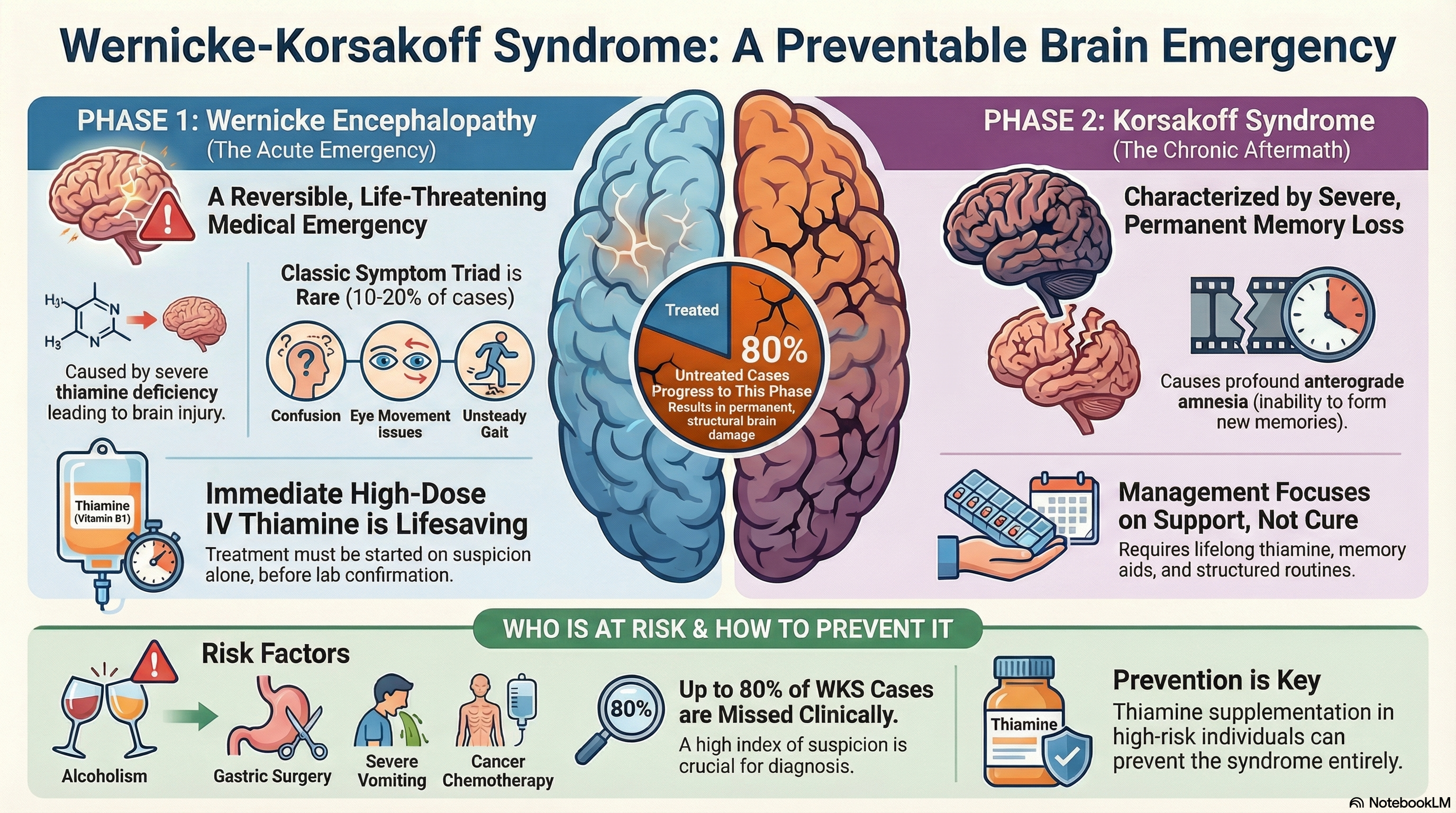What is Wernicke–Korsakoff syndrome?
Wernicke–Korsakoff syndrome is a serious brain condition caused by a severe lack of vitamin B1, also called thiamine. This vitamin is essential for brain health. When the brain does not get enough thiamine, brain cells cannot produce energy and begin to malfunction or die.
This condition is largely preventable and often treatable, especially when caught early. However, if treatment is delayed, it can lead to permanent memory problems, disability, or even death.
Wernicke–Korsakoff syndrome usually develops in two stages:
- Wernicke encephalopathy – the sudden, dangerous early stage
- Korsakoff syndrome – the long-term stage that mainly affects memory

Why Thiamine (Vitamin B1) Is So Important?
Thiamine helps your body turn food—especially sugar—into energy. The brain needs a constant supply of energy to function properly. Unlike some vitamins, the body cannot store much thiamine, so it must be consumed regularly through food.
Foods that normally provide thiamine include:
- Whole grains
- Beans and lentils
- Nuts and seeds
- Pork
- Fortified cereals
When thiamine levels drop too low, the brain is one of the first organs to suffer.
Symptoms of Wernicke–Korsakoff syndrome
Wernicke-Korsakoff syndrome may cause the following symptoms:
Stage 1: Wernicke Encephalopathy (Medical Emergency)
Wernicke encephalopathy often develops quickly, over hours or days. It is a medical emergency and needs immediate treatment. Only a small number of people show all classic signs, but common symptoms include:
-
Confusion and Mental Changes
- Disorientation
- Trouble focusing
- Unusual behavior
- Extreme sleepiness
- In severe cases, coma
- Eye Problems
-
- Blurry or double vision
- Rapid, jerking eye movements
- Difficulty moving the eyes
- Drooping eyelids
- Balance and Walking Problems
-
- Unsteady or staggering walk
- Difficulty standing
- Feeling like the ground is moving
- Other Possible Symptoms
-
- Low body temperature
- Low blood pressure
- Fast heart rate
- Severe weakness
- Dizziness
- Trouble controlling bladder function
Stage 2: Korsakoff Syndrome (Long-Term Phase)
If Wernicke encephalopathy is missed or not treated in time, many people develop Korsakoff syndrome. People with Korsakoff syndrome often have:
- Trouble forming new memories
- Forgetting conversations soon after they happen
- Losing memories from recent years
- Difficulty learning new information
- Confabulation (Making Up Memories)
Korsakoff syndrome often causes permanent brain damage, though small improvements may occur with time and support.
Causes of Wernicke–Korsakoff syndrome
It is a neurological disorder caused by a deficiency of thiamine (vitamin B1). Alcohol abuse is one of the leading causes of this deficiency, as it leads to poor nutrition and impaired thiamine absorption. Other causes may include malnutrition, gastrointestinal disorders, bariatric surgery, or conditions that interfere with thiamine absorption or utilization.
Diagnosis of Wernicke–Korsakoff syndrome
A Wernicke-Korsakoff syndrome diagnosis usually involves:
- Review of medical history, focusing on alcohol use and nutritional status
- Examination of neurological function and signs of thiamine deficiency
- Tests to measure thiamine levels and assess liver function
- An MRI or CT scan of the brain can detect structural abnormalities or signs of brain damage
- Assessment of cognitive function, memory, and other neurological deficits by neuropsychological testing
Treatment for Wernicke-Korsakoff syndrome
Wernicke-Korsakoff syndrome is treated as follows:
- To prevent further neurological damage, high-dose thiamine injections or oral supplements are administered to correct thiamine deficiency.
- In addition to thiamine, individuals may need supplements of other vitamins and nutrients to address underlying malnutrition.
- A cessation of alcohol consumption is essential if alcohol abuse is the underlying cause.
- Occupational therapy, physical therapy, and speech therapy may be recommended to help individuals regain lost function and improve their quality of life.
- Symptom management and relapse prevention may require long-term medical monitoring, nutritional counseling, and support services.
Prevention of Wernicke-Korsakoff syndrome
Wernicke-Korsakoff syndrome can be prevented by:
- Alcohol consumption should be limited and alcohol dependence should be addressed to reduce the risk of developing thiamine deficiency and associated neurological complications.
- Eating a varied and nutritious diet with sources of thiamine, such as whole grains, lean meats, nuts, and legumes, can help prevent thiamine deficiency.
- To prevent complications and improve outcomes, individuals with symptoms of alcohol dependence, malnutrition, or neurological dysfunction should seek medical attention promptly.
Wernicke–Korsakoff syndrome is a serious but often preventable brain condition. Early recognition and fast treatment can save lives and prevent permanent disability. If you or someone you care for is at risk, do not wait. Thiamine treatment is safe—and acting early can make all the difference.




